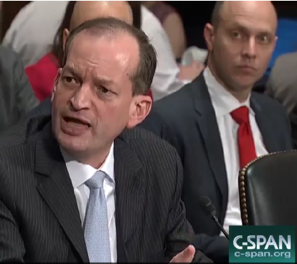
Acosta, the son of Cuban immigrants and a native of Miami, received his undergraduate degree in economics and his law degree from Harvard. He served as a law clerk for Justice Alito on the U.S. Court of Appeals for the Third Circuit, before the Justice was elevated to the Supreme Court. After practicing employment law at a private law firm for about seven years, Acosta service in three Senate-confirmed positions in the George W. Bush Administration: first, as a member of the National Labor Relations Board, then as Assistant Attorney General for Civil Rights in the Department of Justice, and finally as the U.S. Attorney for the Southern District of Florida. Currently, he is the Dean of the Florida International University Law School.
Acosta was nominated for Labor Secretary after Andrew Puzder, the CEO of CKE Restaurants, parent company of the Carl’s Jr. and Hardee’s franchises, withdrew his nomination. Puzder, a frequent speaker and writer, was a controversial nominee because of his public statements on minimum wage, overtime, automation and franchising.
Less is known about Acosta’s views on key issues that are facing the Labor Department. What we do know comes primarily from Acosta’s March 22 confirmation hearing. You can watch all 2 hours and 45 minutes of the hearing on c-span.org, but here are some highlights:
Opinion Letters. In 2009, DOL’s Wage and Hour Division stopped issuing “Opinion Letters” responding to employer questions, instead providing only general guidance through “Administrator Interpretations.” Under the FLSA, an employer who acts in reliance on an Opinion Letter has a complete affirmative defense against all monetary liability. During the eight years of the Obama Administration, DOL issued only eleven Interpretations. During his confirmation hearing Acosta committed that DOL will again issue Opinion Letters, stating that the value of Opinion Letters over Administrator’s Interpretations is that Opinion Letters “are grounded in a specific set of facts.”
Joint Employment and Independent Contracting. Two of the most impactful Interpretations issued by the Obama Administration expanded the definition of joint employment and narrowed the definition of an independent contractors. Employer groups have been advocating to have DOL withdraw both. During his confirmation hearing, Acosta committed to studying issues relating to the “gig” economy, but did not commit to withdrawing the Administrator’s Interpretation on independent contracting. However, he did call DOL’s approach on joint employment “an untraditional approach.”
Overtime Regulations. Perhaps the most important issue facing the Labor Department is the fate of the Final Rule on the white-collar overtime exemptions, which increased the minimum salary for exemption from $23,660 to $47,476 annually. On November 22, 2016, less than two weeks before the new regulations were to go into effect, a federal district court in Texas issued a preliminary injunction blocking the rule. DOL quickly appealed the ruling to the Fifth Circuit Court of Appeals and requested expedited review. The Fifth Circuit granted that motion on December 8, with the DOL’s final brief due on January 31, 2017. But, on January 25, just days after the inauguration of President Trump, DOL asked and was granted an extension of time to file its final brief, in order “to allow incoming leadership personnel adequate time to consider the issues.” DOL requested and received a second extension of time, pushing the due date for its brief to May 1.


